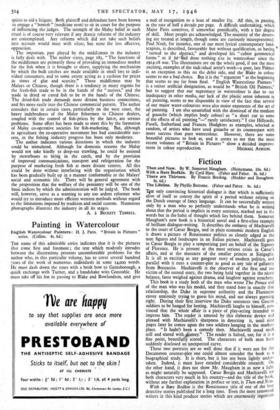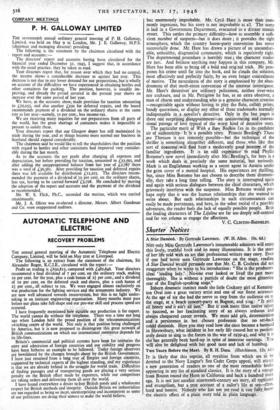Fiction
8s. 6d.) The Lifeline. By Phyllis Bottome. (Faber and Faber. 9s. 6d.) TOE only convincing historical dialogue is that which is sufficiently alive of itself to convey the spirit of a period without relying on the Dutch courage of fancy language. It can be successfully written only by a man who so perfectly understands what he is writing about that the period is implicit in every sentence, marked not in the words but in the habit of thought which lies behind them. Somerset Maugham's new book is a historical novel and a first-class example of brilliant dialogue-writing. It describes the embassy of Machiavelli to the court of Cxsar Borgia, and in plain economic modern English it draws a picture of Renaissance politics as cleanly edged as the neat figures and landscapes in an Italian picture. Machiavelli goes to Cxsar Borgia to play a temporising part on behalf of the Signory of Florence. He is present at the most serious crisis in Cxsar's affairs, and at the massacre of the smaller princes at Sinigaglia. It is all as exciting as any gangster story of modern politics, and parallel with it runs a counter-plot as good as any tale of gallantry from Boccaccio. Machiavelli is the observer of the first and toe victim of the second story, the two being held together in the nicest balance, farce weighed against drama; and laughter against treachery.
This book is a study both of the man who wrote The Prince and of the man who was his model, and they stand here in exactly that relationship, the Duke in supreme authority and the Florentine envoy anxiously trying to guess his mind, and not always guessing right. During their first interview the Duke sentences two Gascon soldiers to be hanged for looting. Machiavelli laughs to himself, con- vinced that the whole affair is a piece of play-acting intended to impress him. The reader is amused by this elaborate device and pleased with Machiavelli's sharpness in detecting it, Until nine pages later he comes upon the two soldiers hanging in the market- place. " It hadn't been a comedy then. Machiavelli stood stock still and stared with smay." The reader is halted, too, for it is a fine point, beautiful fir scored. The characters of both men have suddenly disclosed an unexpected curve.
These two portraits are so well done that if it were not for the Decameron counter-plot one could almost consider the book as a biographical study. It is short, but it has not been lightly under- taken. Indeed, it must have entailed considerable research. On the other hand, it does not show Mr. Maugham in as new a light as might naturally be supposed. Cxsar Borgia and Machiavelli are both characters very much in his country—and the title of the book, without any further explanation in preface or text, is Then and Now. With a Bare Bodkin is the Renaissance title of one of the hest detective stories published for a long time. Even the most renowned writers in this kind produce stories which are enormously ingenious but enormously improbable. Mr. Cyril Hare is more than com- monly ingenious, but his story is not improbable at all. The scene is laid in a Government Department, evacuated to a distant seaside resort. This settles the primary difficulty—how to assemble a suffi- cient number of suspects—but it does more ; it provides the right atmosphere, which the country house-party convention has never successfully done. Mr. Hare has drawn a picture of an uncomfort- able, unhealthy, disgruntled community, which is repulsively right. The departmental procedure is horribly true ; the character studies are just. And bec-ause anything may happen in this company, Mr. Hare has been able to bring off a bold and original trick. He post- pones his crime until far into the book, and he clouds the solution, most effectively and perfectly fairly, by an even longer concealment of motive. The naturalness of the story is emphasised by the aban- donment of that moth-eaten convention of the amateur investigator. Mr. Hare's detectives are ordinary policemen, neither over-wise nor cocksure, and in Mr. Pettigrew he has, as an extra observer, a man of charm and understanding who is a genuine character creation —recognisable again without having to play the flute, colle0 prints, bandy quotations, or display any other of those trademarks normally indispensable in, a novelist's detective. Only in the last pages is there one surprising disappointmentan unconvincing and conven- tional passage of love typical of the worst kind of detective story.
The particular merit of With a Bare Bodkin lies in its. confident air of authenticity- It Is a possible story. Francis -Beediries There are Thirteen is not remotely ,possible—but the techniqUe of the thriller is something altogether different, and those who like that sort of honsense%will find here a moderately good mixtuir of the familiar ingredients. It is an odd experience to read Phyllis Bottome's new novel immediately after Beeding's, for hers is a work which deals in precisely the same material, but seriously. Mark is an Englishman working as a secret agent in Austria under the grim cover of a mental hospital. His experiences are thrilling, but, since Miss Bottome has not chosen to describe them-dramatic- ally, they take a long time telling. The story is interrupted again and again with serious dialogues between the chief characters which grievously interferes with the suspense. Miss Bottome would per- haps reply that it was the human relationships that she wanted to write about. But such relationships in such circumstances can easily be made portentous, and here, in the sober recital of a possible adventure, the reader feels the lack of equally possible people. Both the leading characters of The Lifeline are far too deeply self-centred and far too solemn to engage the affections.
V. C. CLINTON-BADDELEY.































 Previous page
Previous page